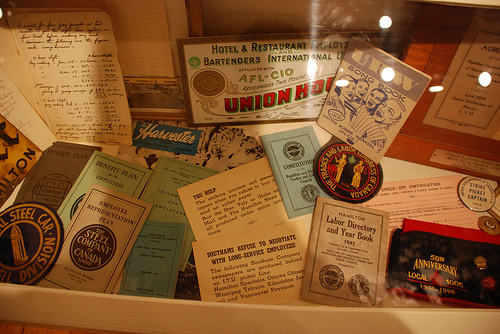Change the conversation, support rabble.ca today.
Although much denigrated by the right these days, union activists are, as the old saying notes, “the people who brought you the weekend.”
The right apparently wants you to believe that the weekend is now out of date.
Prime Minister Stephen Harper and Ontario Conservative Leader Tim Hudak, along with influential members of the corporate and media world, are hostile to unions, rarely missing an opportunity to portray union leaders as autocratic “bosses.”
Yet, if you’re middle class, a union probably helped you or your ancestors get there. In the 19th century, workers typically toiled 10 to 16 hours a day, six or seven days a week. Unions fought to change that. In the decades that followed the Great Depression, unions won higher wages and better working conditions for their members, setting a standard with ripple effects that led to a better deal for all workers.
But in recent decades, many of the precious, hard-fought union gains — job security, workplace pensions, as well as broader social goals like public pensions and unemployment insurance — have been under fierce attack by the corporate world (where workers really are under the thumb of unelected “bosses”).
Part of the strategy has been to pit worker against worker. So, as private sector workers have lost ground, they’ve been encouraged to resent public sector workers, whose unions have generally been stronger and better able to protect them.
With workers increasingly baited into a dogfight against each other, it’s been easier to make the case that unions are no longer relevant.
But, given the intensity of the attack, unions are likely more necessary than ever. If you’ve grown attached to the weekend, not to mention the eight-hour day, this probably isn’t the time to throw unions under the bus.
In fact, they’re really the only organized line of defence against the broad right-wing assault on a wide range of social programs and government regulations important to most Canadians.
We’re told that many of these benefits and protections have to be cut back to make our economy more flexible in an era of globalization.
In fact, what is referred to as “globalization” is simply the set of laws governing the global economy. There’s nothing natural or inevitable about these laws, which have been crafted by corporate interests and their think-tanks. They just reflect the growing political muscle of the corporate elite, which has reshaped international and domestic laws in recent decades to their own advantage.
One of the most outrageous attacks on hard-won benefits was Harper’s decision last year to raise public pension eligibility by two years. Most commentators supported the move, noting that people are living longer.
But this misses the point. The real question is: as the country has grown richer, who should benefit? Under the more egalitarian system that prevailed during the early postwar decades, the economic benefits would have been more widely shared and could have been used to actually lower the retirement age (or extend holiday time, such as in Scandinavia, where the norm is six weeks paid vacation).
A few decades ago, North Americans often whimsically posed the question: in the future, what will we do with all our leisure time?
As it turned out, our leisure time shrunk (with two years of it now snatched away by the Harper government).
Indeed, instead of being widely shared, almost all the benefits of economic growth in recent decades have been siphoned off by a small corporate elite.
It’s that same corporate elite, and its political and media supporters, who now assure us that unions are no longer relevant.
This is curious, since corporations still see the wisdom in collective action for themselves; they band together to form business lobby groups. But, when it comes to working people, collective action is apparently out of date.
Lined up against today’s worker is the corporate world — the most powerful set of interests in history.
But, hey, why would a worker want to act collectively when she could take on this corporate Goliath all on her own?
Linda McQuaig is author of It’s the Crude, Dude: War, Big Oil and the Fight for the Planet and The Trouble With Billionaires. This article was first published in the Toronto Star.
Photo: Lennon Ying-Dah Wong/Flickr



